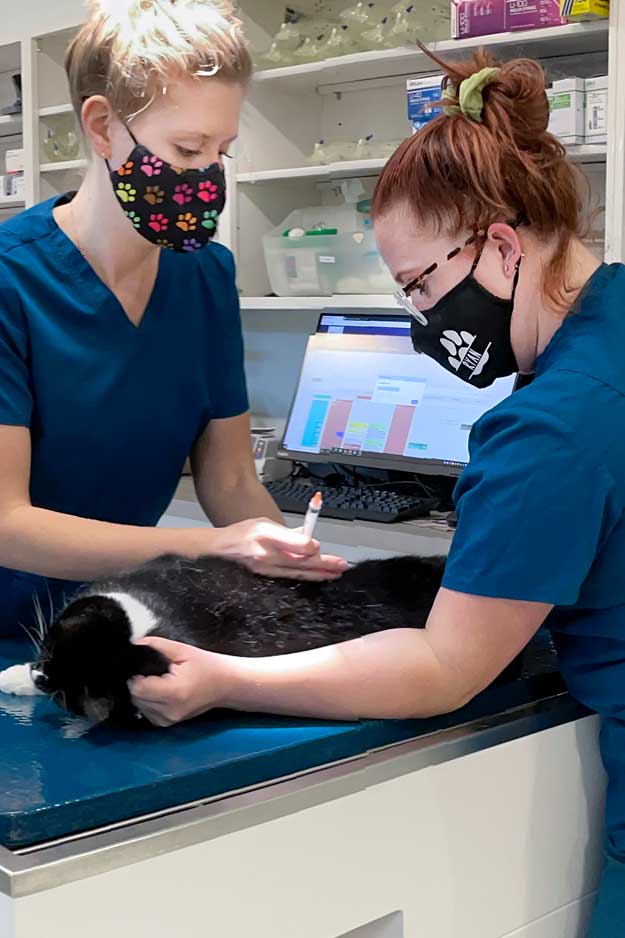
Vaccines for Cats
Vaccine schedules can be complicated and confusing and many options for vaccines depend on the lifestyle of your cat and on any medical problems as well.
Core Cat Vaccines – These are the three core vaccines that we feel all cats should receive:
- FVRCP (which is a combination vaccine of rhinotracheitis, calici, and panleukopenia (or feline distemper).
- FELV (which is feline leukemia and recommended only for outdoor cats).
- Rabies: Rabies is our only vaccine that is regulated by the state and county.
Which diseases do these vaccines treat?
1. Rhinotracheitis (the R in FVRCP) – This is a herpes virus and is part of the “Upper Respiratory Complex”. It can cause fever, anorexia, sneezing, discharge from the nose and/or eyes and coughing. This virus will remain in a cat’s body for the rest of its life and later cause disease of the cornea or reoccurrence of other symptoms.
2. Calici (the C in FVRCP) – This is a calicivirus and is another part of the “Upper Respiratory Complex”. It can cause fever and ulcers on the tongue and mouth.
3. Panleukopenia (the P in FVRCP) – Also referred to as “Feline Distemper”, this disease is caused by a parvovirus. This virus causes a significant decrease in white blood cells which are needed to fight off infection. It can cause severe diarrhea, vomiting, anorexia and fever. Cats who survive usually don’t have any lasting problems. The virus is highly contagious, and vaccination is an effective prevention.
4. Feline Leukemia – The FELV vaccine is given at 12 weeks, boostered at 16 weeks and then boostered yearly as indicated. The Feline Leukemia virus affects the cat’s bone marrow and therefore its ability to fight off infection. It can cause weight loss, gingivitis/stomatitis, lethargy, chronic infections (especially upper respiratory infections), fever and in some cases even lymphoma (cancer of the lymph nodes). It is important to let us know if your cat is going to be indoors or outdoors. There is a 1 in 10,000 chance your cat will get an aggressive sarcoma tumor at the vaccine site. If your cat is indoor-only, then there is a much less chance of getting FELV than the cancerous tumor. Therefore this vaccine is NOT recommended for strictly indoor cats. If you are unsure, please discuss it with us. However, this vaccine is recommended for kittens because they have the highest chance of escaping your house and are also the most susceptible to FELV at a young age. Many times we do not continue this vaccine after their kitten vaccines.
5. Rabies – Rabies is a very serious disease transmitted by saliva either by bite wounds or saliva contact with open wounds. Incubation from time of exposure to symptoms is usually 3-6 weeks but can be as long as 6 months. It attacks brain cells and causes neurologic symptoms. Once an animal gets rabies it is always fatal. Vaccination for rabies is required by state law for dogs and in many communities keeping cats up to date with the rabies vaccine is also required.
Request Appointment
Located at 1435 Zoo Parkway, Asheboro, NC 27205, Animal Hospital Randolph provides complete veterinary medical and surgical care as well as boarding for dogs and cats from Randolph County and surrounding areas.
